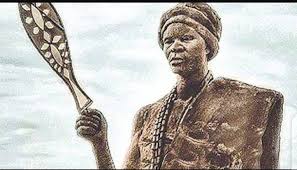Efunsetan Aniwura, an iconic figure in Yoruba history, was a powerful and influential woman whose legacy continues to resonate today. Born in the 18th century in Abeokuta, present-day Nigeria, Efunsetan rose to prominence as one of the wealthiest and most formidable women in the Oyo Empire. Her story is one of resilience, ambition, and complex leadership that has inspired many and shaped the historical narrative of women in African societies.
Efunsetan Aniwura (c. 1820s – June 30, 1874) was the second Iyalode of Ibadan and one of the pre-eminent slave traders in the 19th century Ibadan. Revered as a successful merchant and trader, her impact encompassed the political, military, economic and religious spheres of Ibadan. She was famous for being arguably the most powerful, and certainly, one of the wealthiest – Yoruba women that ever lived. She has been described by historians as an authoritarian leader, who often utilized capital punishment on erring slaves. This has been attributed to psychological breakdown resulting from the death of her only daughter and her inability to procreate afterwards.
Early Life and Rise to Power
Efunsetan Aniwura was born into a wealthy family and inherited a significant portion of her wealth from her parents. However, her rise to power was not solely due to inheritance; she was a shrewd businesswoman who expanded her wealth through agriculture and trade. Efunsetan owned vast farmlands and traded in various goods, including tobacco and slaves, which were highly lucrative at the time.
Her business acumen and strategic marriages further solidified her position in society. She married several influential men, although she eventually chose to remain a widow, focusing on her business and political ambitions. This independence was unusual for women of her time and contributed to her formidable reputation.
Read more: https://www.youtube.com/watch?v=30SwDz-E-Oc
Political Influence and Leadership
Efunsetan’s influence extended beyond her economic power; she was also a significant political figure. She held the title of Iyalode, a position that made her the head
of the women’s council and gave her substantial authority in the governance of Ibadan, a major city in the Oyo Empire. As Iyalode, Efunsetan was responsible
for representing women’s interests, advising the king, and playing a crucial role in decision-making processes.
Both respect and fear marked her leadership. Efunsetan was known for her strict and sometimes ruthless approach to governance. She maintained a private
army and was deeply involved in the military and political affairs of Ibadan. Her assertiveness and uncompromising nature earned her many enemies, but also unwavering loyalty from her supporters.
Controversies and Challenges
Efunsetan Aniwura’s reign was not without controversy. Her strict policies and harsh treatment of her workers, including the execution of those who defied her orders,
led to numerous conflicts. Her inability to bear children and the tragic loss of her only child further fueled her stern demeanor and contributed to her complex legacy.
Her power eventually attracted significant opposition, leading to a conspiracy to remove her from power. In a dramatic turn of events, she was dethroned
and executed by her rivals. Despite her fall, her story remains a powerful testament to the complexities of leadership and the role of women in Yoruba society.
Legacy
Efunsetan Aniwura’s legacy is multifaceted. She is remembered as a pioneering figure who broke gender barriers and asserted her authority in a male-dominated society.
Her life has been the subject of numerous plays, books, and scholarly articles, reflecting her enduring impact on Nigerian history and culture.
Her story highlights the challenges and opportunities faced by women in positions of power and continues to inspire discussions about gender, leadership, and resilience.
Efunsetan Aniwura’s life is a reminder of the strength and complexity of female leadership in African history.
Efunsetan Aniwura remains a significant figure in the annals of Yoruba and Nigerian history. Her journey from a wealthy heiress to a powerful political leader
demonstrates the potential for women to influence and shape society. Her legacy, though controversial, underscores the importance of female leadership and
the enduring impact of strong, independent women in history.
Read Also: https://placesandlifestyle.com/yoruba-festivals-and-traditions/




